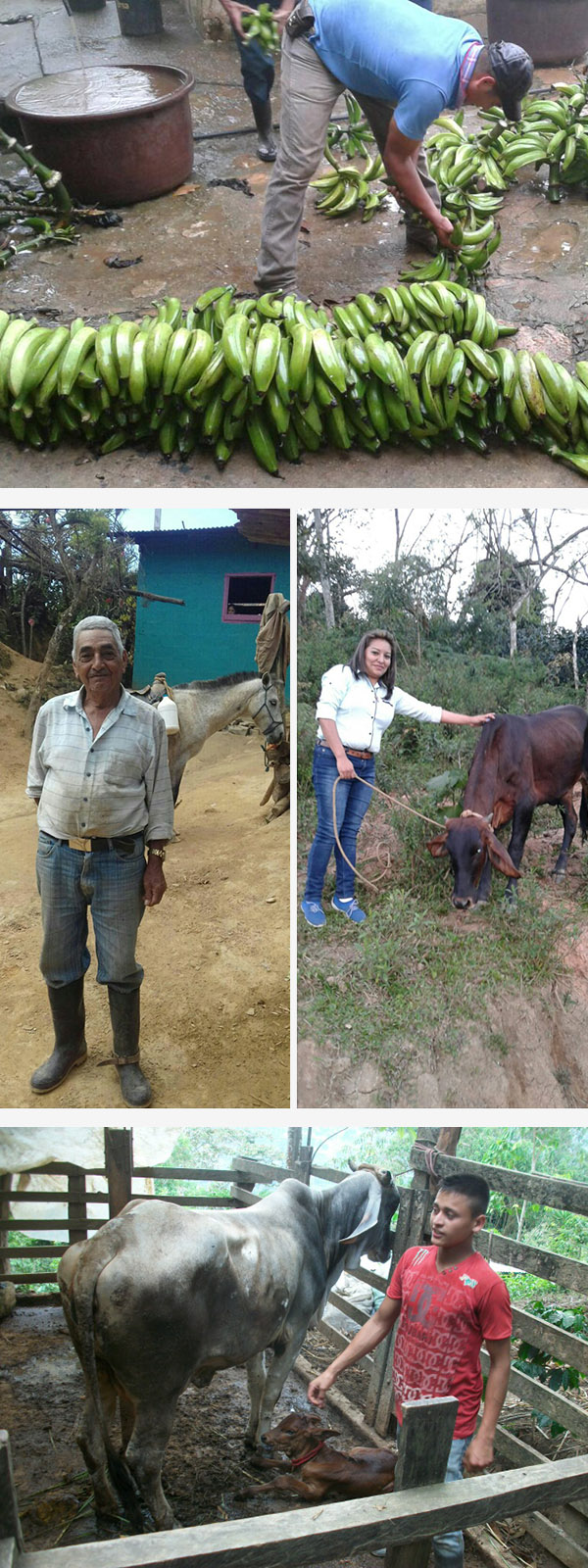Stories of Change

Top: families preparing plantains to donate to the school system. Middle: Cándido Rivera (left) and a woman from the family who received the calf he contributed (right). Bottom: Bairon Cantarero and the cow his family has raised as part of the program.
In Honduras, 600 families participate in CWS-supported food security activities.
Source: CWS Annual Report 2017
A comprehensive approach to food security in Honduras
“I have appreciated how they pay attention to rural families, and I have learned a lot.”
These are the words of Cándido Rivera, from the community of La Cumbre in Nueva Frontera municipality, Honduras. CWS and partner CASM have a food security and nutrition program here to support families as they improve their diets and achieve food security.
Part of this effort means better nutrition for children. In the last year, two food fairs have been held in Nueva Frontera with more than 200 adults and children participating. These events are a learning exchange where participants can try new recipes and discuss the nutritional values of the foods they are eating. In the last five years, 10 communities have hosted fairs.
A woman from the community of San Miguel told us, “As mother ‘guides’ [participants in nutrition trainings], we feel happy with this fair, as it has brought us joy to have learned how to improve our children’s diets. This is the first time we have had an event such as this in our community, and we hope to work together to continue to organize fairs like this in the future.”
In the spirit of helping children have better nutrition, CASM worked out a deal with the local school system and some families that participate in the CWS-supported program. When the school system received government funds to provide snacks to primary school students, CASM helped negotiate a contract with four families in Nueva Frontera to provide some of the needed products. During a 10-week contract, families are providing plantains, tomatoes, eggs and bananas to the school system and earning an income by doing so. As a result, 1,800 children are eating a more diverse diet at school. The families are now registered vendors (a status that CASM helped them get), so they can charge more for their produce moving forward, too!
Another aspect of food security for these family is livestock. In the last year, the CWS-supported program gave cows to 17 families. Six of these were calves that were donated by other program participants; when they receive a cow, they commit to giving a calf to another family in the future. Not only do families consume more milk when they have a cow, but they can also sell milk to their neighbors for extra income and have the possibility to earn even more income by selling the cow or calves in the future.
“I am making a ‘payment’ for the cow by benefiting another family with the calf. I wish them the same success that my family had with our cow, whom we continue caring for so that we can produce milk and more calves in the future. I am happy with all that we have achieved,” says Cándido.
Bairon Cantarero lives in Nueva Frontera, and his family has participated in the project in the past, including receiving a cow. He was studying agriculture, but his family didn’t have the money for him to continue his studies. CASM advocated on his behalf and secured funding so that Bairon could continue his studies and attend an agricultural school. This education means opportunities for him that he would not otherwise have had.
The challenges standing between families and food security are often multi-faceted, and so is our response to them. From snacks in school to milk for families, we are creating tailored, effective strategies to helping families have more nutritious and plentiful diets in Honduras.
